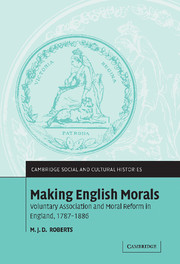Book contents
- Frontmatter
- Contents
- Preface
- Acknowledgements
- List of abbreviations
- Introduction
- 1 Moral reform in the 1780s: the making of an agenda
- 2 ‘The best means of national safety’: moral reform in wartime, 1795–1815
- 3 Taming the masses, 1815–1834
- 4 From social control to self-control, 1834–1857
- 5 Moral individualism: the renewal and reappraisal of an ideal, 1857–1880
- 6 The late Victorian crisis of moral reform: the 1880s and after
- Conclusion
- Select bibliography
- Index
Introduction
Published online by Cambridge University Press: 01 July 2009
- Frontmatter
- Contents
- Preface
- Acknowledgements
- List of abbreviations
- Introduction
- 1 Moral reform in the 1780s: the making of an agenda
- 2 ‘The best means of national safety’: moral reform in wartime, 1795–1815
- 3 Taming the masses, 1815–1834
- 4 From social control to self-control, 1834–1857
- 5 Moral individualism: the renewal and reappraisal of an ideal, 1857–1880
- 6 The late Victorian crisis of moral reform: the 1880s and after
- Conclusion
- Select bibliography
- Index
Summary
A history of moral change is, to a certain degree, a history of everything. This book is of more limited scope. It aims to explore the history of English moral reform – that is, of self-conscious, organised efforts by groups of concerned citizens to change moral values and to modify patterns of behaviour associated with them. It is argued that ‘moral reform’ as a category of social action was a particular preoccupation of the period between the Revolution Settlement of 1688–9 and the turn of the twentieth century and, more distinctly still, of the hundred years between the 1780s and the 1880s.
Moral reform identified
How is moral reform to be identified? It may help to begin with an attempt at definition by an actively engaged contemporary. In 1852 the British Temperance Advocate published an article: ‘What the Temperance Society is not’. In this article the author compared the work of a temperance society with the work of four other types of volunteer action. A temperance society was ‘not a charitable institution’ – though it helped to teach ‘the true charity which restores to sound moral habits, to virtuous self-help and self-reliance’. Nor was it ‘an educational society’ or a ‘sanitary association’ – though its encouragement to self-management would assist members towards accumulation of the resources and will-power needed to raise their educational and environmental goals. Finally, it was not ‘a political union’ – though its members, by their self-control, proved themselves fit for recognition as citizens.
- Type
- Chapter
- Information
- Making English MoralsVoluntary Association and Moral Reform in England, 1787–1886, pp. 1 - 16Publisher: Cambridge University PressPrint publication year: 2004
- 1
- Cited by

